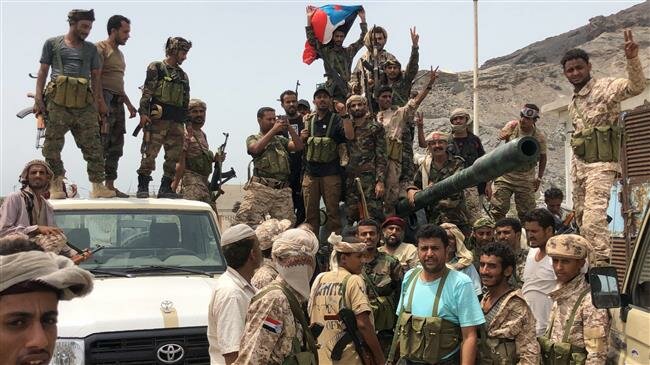The Saudi-UAE confrontation , a wearing-away of Saudi Arabia’s coalition in southern Yemen
YemenExtra
Y.A
Saudi Arabia and the UAE, increasingly wary allies of one another in the War on Yemen, are poised to sharpen their competition in the Red Sea-Horn of Africa region to the point of becoming “frenemies” amidst both parties’ efforts to forge different coalitions in this strategic space through which the vast majority of European-Asian trade traverses.
Most observers agree that the UAE’s planned military drawdown from Yemen sharpened the competition between that country and its Saudi allies in the war, but the fact of the matter is that the general dynamic of these two GCC countries becoming rivals of one another actually started at the onset of that campaign.
The Emirates leveraged its influence in the Horn of Africa to set up a military base in Eritrea, after which it helped broker an historic peace between that nation and its Ethiopian neighbor. This gave Abu Dhabi strategic depth in Africa’s second most populous state and its fastest growing economy, which also happens to be Beijing’s top partner in the continent and a promising future exporter of large-scale agricultural products to the Gulf. While that was happening, the UAE also solidified its military control over Yemen’s island of Socotra at the entrance to the Gulf of Aden on top of reinforcing its influence in the breakaway region of “Somaliland”, which altogether resulted in it becoming a transregional power in de-facto control of the strategic space through which the vast majority of European-Asian trade traverses.
The Saudis, meanwhile, have been in a state of shock that their “little brother” is outdoing them by punching well above its weight and behaving like more of a Great Power than they are. Riyadh’s regional ambitions were thwarted by its disastrous War on Yemen that was supposed to catapult the country into becoming a global power, yet it’s this very same campaign that’s responsible for actualizing Abu Dhabi’s exact same vision instead and thus turning the two allies into frenemies. Not to be outdone, the Saudis have tried to salvage their regional influence by attempting to forge a Red Sea alliance at the end of last year between itself, Egypt, Djibouti, Somalia, Sudan, Yemen, and Jordan, though this effort has thus far failed to accomplish anything tangible except for conspicuously excluding Emirati allies Eritrea, Ethiopia, and “Somaliland” and proving that the initiative was intended to counter its partner’s regional influence. Amidst all of this, Yemen remains the pivotal bone of contention in the Saudi-Emirati competition, and the situation there has recently heated up.
On Tuesday, militia from the separatist Southern Transitional Council (STC) group seized two military camps near Zinjibar, the capital of Yemen’s southern province of Abyan.
The two camps were being operated by militants loyal to ex-Yemeni president Abd Rabbuh Mansur Hadi.
Earlier in the day, a spokesperson for the STC had told AFP that the two camps had been surrounded by the separatist militia.
The STC receives patronage from the UAE, whereas the militants fighting on Hadi’s behalf are supported by Saudi Arabia. Abu Dhabi is presumed Riyadh’s main ally in a coalition waging war on Yemen to restore Hadi to power.
Local sources said there were still fierce clashes between the two sides in Zinjibar. The STC militants are believed to have gained the upper hand in the fighting after taking over the two military bases in the area.
Local Yemeni militias loyal to either the UAE or Saudi Arabia have been engaged in a bloody military campaign against Yemen to reinstate ousted former President Abd Rabbuh Mansur Hadi since 2015, But, while reinstating Hadi was the primary justification for the Coalition’s war on Yemen, both Saudi Arabia and the UAE have found themselves pursuing rival agendas in the country, including efforts by the UAE to split Yemen into two countries, North and South.
Despite sending reinforcements from western Yemen and the eastern province of Shabwa, the official Saudi position regarding the recent clashes in Aden remains vague and the Kingdom has not yet moved to protect its allies in the port city. Saudi media outlets, however, are covering the developments in Aden as a coup against legitimacy, describing UAE supporters and forces as terrorists
In March 2015, the US -backed –Saudi-led coalition started a war against Yemen with the declared aim of crushing the Houthi Ansarullah movement, who had taken over from the staunch Riyadh ally and fugitive former president Abd Rabbuh Mansur Hadi, while also seeking to secure the Saudi border with its southern neighbor. Three years and over 600,000 dead and injured Yemeni people and prevented the patients from travelling abroad for treatment and blocked the entry of medicine into the war-torn country, the war has yielded little to that effect.
Despite the coalition claims that it is bombing the positions of the Ansarullah fighters, Saudi bombers are flattening residential areas and civilian infrastructures.
More than 2,200 others have died of cholera, and the crisis has triggered what the United Nations has described as the world’s worst humanitarian disaster.
#YemenCantWait #YemenGenocide #Yemen #Yemencantwait #YemenGenocide #Yemen_children #StoparmingEmirates #StoparmingSaudi #Stopthewaronyemen#LivingInYemenOnTheEdge#SoldarityWithThePeopleOfYemen

